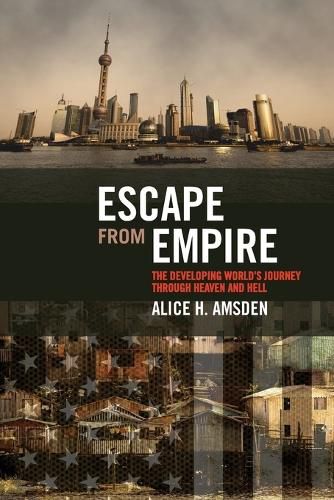Readings Newsletter
Become a Readings Member to make your shopping experience even easier.
Sign in or sign up for free!
You’re not far away from qualifying for FREE standard shipping within Australia
You’ve qualified for FREE standard shipping within Australia
The cart is loading…






The American government has been both miracle worker and villain in the developing world. From the end of World War II until the 1980s poor countries, including many in Africa and the Middle East, enjoyed a modicum of economic growth. New industries mushroomed and skilled jobs multiplied, thanks in part to flexible American policies that showed an awareness of the diversity of Third World countries and an appreciation for their long-standing knowledge about how their own economies worked. Then during the Reagan era, American policy changed. The definition of laissez-faire shifted from Do it your way, to an imperial Do it our way. Growth in the developing world slowed, income inequalities skyrocketed, and financial crises raged. Only East Asian economies resisted the strict prescriptions of Washington and continued to boom. Why? In Escape from Empire, Alice Amsden argues provocatively that the more freedom a developing country has to determine its own policies, the faster its economy will grow. America’s recent inflexibility–as it has single-mindedly imposed the same rules, laws, and institutions on all developing economies under its influence–has been the backdrop to the rise of two new giants, China and India, who have built economic power in their own way.Amsden describes the two eras in America’s relationship with the developing world as Heaven and Hell –a beneficent and politically savvy empire followed by a dictatorial, ideology-driven one. What will the next American empire learn from the failure of the last? Amsden argues convincingly that the world–and the United States–will be infinitely better off if new centers of power are met with sensible policies rather than hard-knuckled ideologies. But, she asks, can it be done?
$9.00 standard shipping within Australia
FREE standard shipping within Australia for orders over $100.00
Express & International shipping calculated at checkout
The American government has been both miracle worker and villain in the developing world. From the end of World War II until the 1980s poor countries, including many in Africa and the Middle East, enjoyed a modicum of economic growth. New industries mushroomed and skilled jobs multiplied, thanks in part to flexible American policies that showed an awareness of the diversity of Third World countries and an appreciation for their long-standing knowledge about how their own economies worked. Then during the Reagan era, American policy changed. The definition of laissez-faire shifted from Do it your way, to an imperial Do it our way. Growth in the developing world slowed, income inequalities skyrocketed, and financial crises raged. Only East Asian economies resisted the strict prescriptions of Washington and continued to boom. Why? In Escape from Empire, Alice Amsden argues provocatively that the more freedom a developing country has to determine its own policies, the faster its economy will grow. America’s recent inflexibility–as it has single-mindedly imposed the same rules, laws, and institutions on all developing economies under its influence–has been the backdrop to the rise of two new giants, China and India, who have built economic power in their own way.Amsden describes the two eras in America’s relationship with the developing world as Heaven and Hell –a beneficent and politically savvy empire followed by a dictatorial, ideology-driven one. What will the next American empire learn from the failure of the last? Amsden argues convincingly that the world–and the United States–will be infinitely better off if new centers of power are met with sensible policies rather than hard-knuckled ideologies. But, she asks, can it be done?